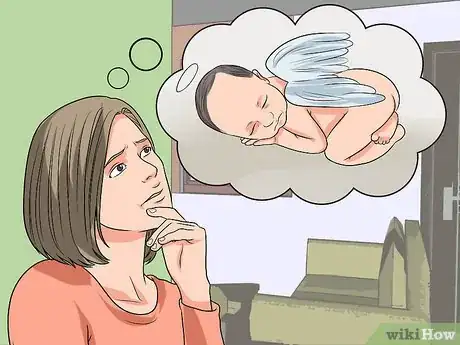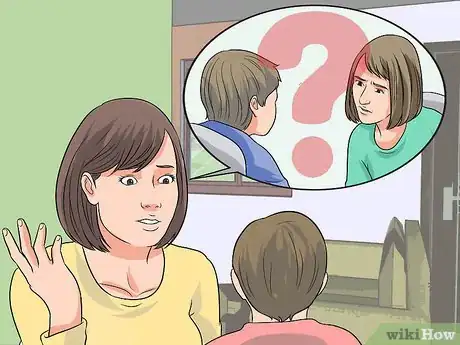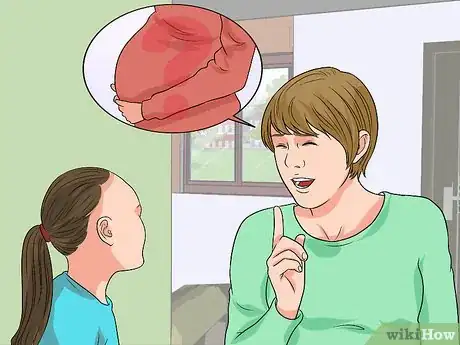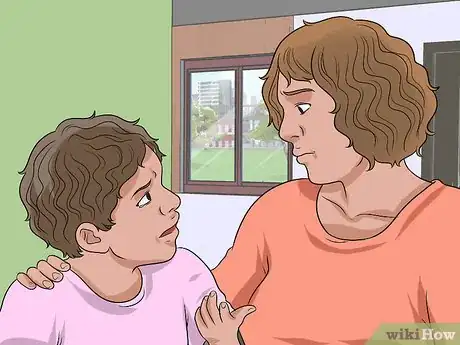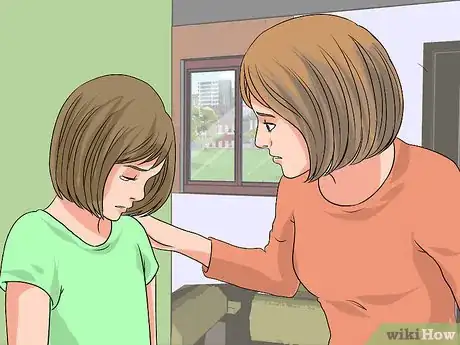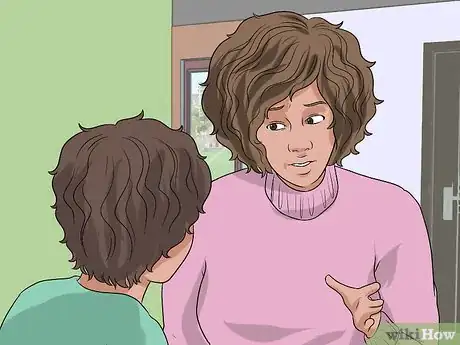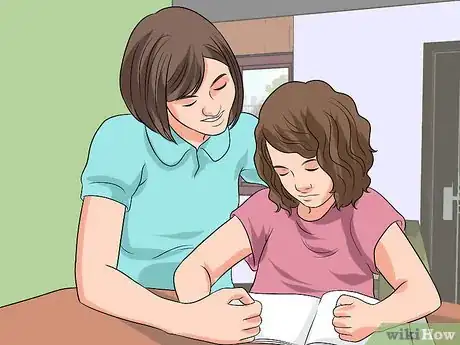This article was co-authored by Trudi Griffin, LPC, MS. Trudi Griffin is a Licensed Professional Counselor in Wisconsin specializing in Addictions and Mental Health. She provides therapy to people who struggle with addictions, mental health, and trauma in community health settings and private practice. She received her MS in Clinical Mental Health Counseling from Marquette University in 2011.
This article has been viewed 52,012 times.
Having a miscarriage can be an emotionally difficult process. You will understandably be sad and grieving. Many people experience miscarriage and have a difficult time coping. The situation can feel even more complicated if you already have children. If your children knew that you were pregnant, you may feel like you need to explain the miscarriage to them. This can be a difficult conversation, but a necessary one. There are several steps you can take to make the process a little easier.
Steps
Deciding What To Say to Your Child
-
1Plan what you want to say. This will be a difficult, but important conversation. You may want to take some time to carefully consider what you want to say to your child. You might be emotional when breaking the news, so it can be useful to have an idea of what you want to say.[1]
- Decide if you want to bring faith into the conversation. If you are a religious person, you may choose to explain that the baby went to heaven.
- Remember that children can't always understand complex concepts. It is best to keep your explanation simple.
- You might try saying, "The baby wasn't healthy, so he wasn't able to keep living." Decide whether or not you want to use the words "death" or "dead".
-
2Choose the right time. Children are very sensitive to moods and emotions. Even a small child can tell when you are sad or upset. Try to find a time to tell your child about the miscarriage as soon as you are feeling up to it.[2]
- Pick a time when your child will have the best attention span. For example, you may not want to broach the subject when he is hungry or getting ready to head to school.
- Make sure that you will have plenty of time to talk. Your child might have lots of questions, so it's a good idea to have this discussion when you have time to answer them.
- Explain to your child that you want to have an important discussion. You can try saying, "Tom, I need to talk to you about something really important. Do you have time to sit down and talk to me?"
Advertisement -
3Talk to your younger child. When you are deciding how to tell a child about your miscarriage, it is important to take your child's age into account. You will want to base your words and explanation on their comprehension level. For example, your preschooler might not have a grasp on what it means to die.[3]
- Be honest and direct with a young child. Keep your words simple. You don't need to offer any medical explanations.
- Try to avoid saying that you "lost" the baby. Your child might think you simply misplaced the baby, and could find it later. Your child could also worry that they might get lost, too.
- It's usually best not to say, "The baby feel asleep and didn't wake up." This could cause your young child to develop a fear of going to sleep.
- You could try saying, "Remember how mommy was pregnant? Something happened to the baby and it could not live. So that baby is not going to come to live with us."
-
4Break the news to an older child. You can be a little more specific when you are talking to an older child. By the age of 8 or 9, most kids will have a pretty clear understanding of death. Teenagers can understand death the same way that adults do.[4]
- It is still best to be direct and honest. You can try saying, "Susan, I had a miscarriage. The baby died."
- Older children might have even more questions for you than younger children. Be ready to address what, specifically, happened. If the doctor doesn't know what caused the miscarriage, you can share that information.
- Allow your children to comfort you. Your child may want to offer you comfort and support. You can say, "Yes, thank you, a hug would be wonderful right now."
-
5Be honest about other people's reactions. Your child may see family members grieving. An explanation can help them feel less scared or confused. If the child seems worried, reassure them that this is not anybody's fault, they don't need to "fix" it, and that people will feel better in time.
- "Mommy feels sad about the baby. That's why you saw her crying and why she's more tired lately. It's going to take her a little while to feel better."
- "If you see Dad and me being sadder than usual, that's why."
- "Daddy is having a hard time right now because he was excited about the baby and now he's sad that there's no baby. It's not anybody's fault. You just keep doing your best. Daddy will feel better; he just needs to be sad for a little while first."
- "I'm so sorry that I yelled at you. I have been feeling cranky because I'm sad about the baby. It's still not nice to yell at people, so if I lose my temper, you can tell me to stop and you can walk away. I will work on being fair to you while I am sad."
Tip: Even if you do most of your grieving when your child isn't around, they'll still notice that you aren't as happy as usual. Talking about it helps the child understand that it isn't their fault.
-
6Have a support system. After a miscarriage, you may be feeling a wide range of emotions. Remember that is completely normal. If you think it would help, consider having someone there to support you when you talk to your child. It might give you some comfort during a difficult conversation.[5]
- A younger child might respond well to having someone else in the room. You might become very emotional, which can sometimes frighten small children.
- Ask a close, trusted friend to be with you. You could say, "Ann, I have to tell the kids about my miscarriage. Would you mind being there, just to support me and them?"
- A grandparent or other family member might be another good choice. You might explain, "Mom, I have to have a tough talk with Amy. Could you be there to help me answer her questions?"
Communicating Effectively
-
1Actively listen. No matter how old your child is, it is important that you communicate as effectively as possible. During the conversation, show them that you hear them. Actively listening is one of the best ways to have a constructive conversation with your child.
- After you have told your child about the miscarriage, give them a chance to respond. Listen carefully to your child's reaction.
- Show that you are listening by maintaining eye contact. You can also use touch, such as putting an arm around a shoulder.
- Try paraphrasing. You could say, "I hear you saying that you are confused and sad. I understand."
-
2Answer questions. Your child might have a lot of questions and concerns. Although it might be emotional for you, be prepared to answer their questions as honestly as possible. Remember that it is normal for kids to be curious.[6]
- Very young children have a very "me"-centric view of the world. Be prepared for questions such as "Will this happen to me?" or "Was it my fault?"
- Take care to reassure your child. You can say, "No, it was not your fault. And no, the same thing will not happen to you."
- Older children might have more specific questions. A teenager might say, "Will this happen again? Are you going to try to have another baby?"
-
3Expect various reactions. A big part of communicating effectively with your child involves respecting their reaction. It is important to understand that each child will process the information differently. Try to prepare yourself for a variety of reactions.[7]
- Younger children might appear to be apathetic. Maybe your child responds to the news by saying, "Ok. Can we go to the park now?" Try not to take this personally.
- A teenager might respond by acting out. Slamming doors and playing loud music might be how they express their emotions.
- Explain to your child that everyone is entitled to feel their own emotions. There is no right or wrong way to feel.
- Find a way to help your child express their feelings. For example, a young child might find it helpful to draw a picture.
-
4Have a follow up conversation. No matter how constructive your conversation feels, be prepared to have another discussion. Miscarriage is not a topic that can generally be dealt with in just one talk. Be ready to answer more questions at a later time.[8]
- It might take your child some time to process the information. Don't be surprised if the day after the talk, your preschooler asks where the baby is. Be ready to have the conversation again.
- Check in with your older child. A few days later it would be a good idea to say, "How are you feeling? Is there any way that I can help you?"
- Some children might feel the need to honor the baby. You could consider saying a few words as a memorial, or maybe singing a song together.
-
5Make your child feel safe. Unpredictable events, like a miscarriage, can lessen your child's sense of security. After you explain the miscarriage, take care to reassure your child. You can use words and actions to help your child feel safe.[9]
- Stick to routines. As much as possible, try not to disrupt your child's life. If he is used to eating dinner at 6, try to make that happen, even when you're having a rough day.
- Keep reminding your child how much you love them. You can say, "Mommy is sad, but you make me happy. I love you very much."
- Follow through on promises. For example, if you promised that grandma would come visit when the baby was born, try to arrange a visit with grandma.
Finding Resources
-
1Talk to your doctor. After a miscarriage, you will understandably be going through a difficult time. If you find yourself needing help, make sure to ask for it. Your doctor can be an excellent resource.[10]
- Ask any medically related questions that you have. Sometimes getting answers can help you cope.
- Maybe you are having a tough time dealing with grief or sadness. Ask your doctor to recommend a therapist.
- Talking to a counselor might help you deal with your emotions. Consider going to therapy for a while.
-
2Consult friends and family. Let your friends and family know what you are going through. It is important to tell them what you have told your child. That way, they know what is appropriate to say.[11]
- For example, you can say, "Rachel, we've told Charlie that the baby died. I just wanted you to know, in case he brings up the subject." Let your friends and family know how they should react if your child brings up the miscarriage.
- Communicate with the school. If you have a young child, let his teacher know what's going on. You want your child to feel supported at school, too.
- You can try saying, "We just wanted to let you know that Max is going through a hard time. Please let us know if he asks you any tough questions."
-
3Use a book. It might be very difficult to figure out how to talk to your child. A miscarriage is very emotional. You could consider using a book to help your child understand.
- You can try a children's book that deals with death. For example, The Velveteen Rabbit might be useful.
- There are also books written specifically to help children understand miscarriage. For example, Goodbye Baby and All Shining in the Spring have been helpful for some people.
References
- ↑ https://www.miscarriageassociation.org.uk/wp-content/uploads/2016/10/Talking-to-Children.pdf
- ↑ http://www.babycenter.com/0_how-to-talk-to-your-preschooler-about-pregnancy-loss_10310179.bc?showAll=true
- ↑ https://www.miscarriageassociation.org.uk/wp-content/uploads/2016/10/Talking-to-Children.pdf
- ↑ https://www.miscarriageassociation.org.uk/wp-content/uploads/2016/10/Talking-to-Children.pdf
- ↑ http://www.babycentre.co.uk/a1014794/explaining-a-pregnancy-loss-to-your-child
- ↑ http://www.silentgrief.com/articles/index.cgi?view_records=1&Category=Miscarriage&ID=93
- ↑ https://www.miscarriageassociation.org.uk/wp-content/uploads/2016/10/Talking-to-Children.pdf
- ↑ http://www.silentgrief.com/articles/index.cgi?view_records=1&Category=Miscarriage&ID=93
- ↑ http://www.babycenter.com/0_how-to-talk-to-your-preschooler-about-pregnancy-loss_10310179.bc?showAll=true
